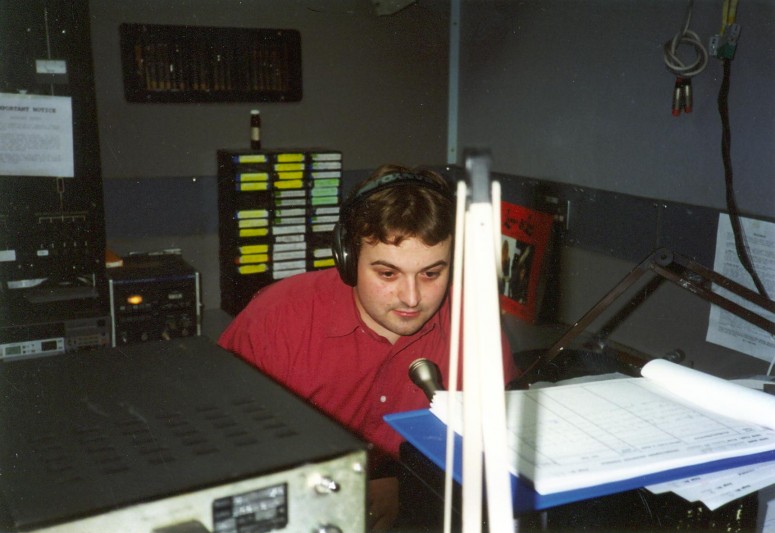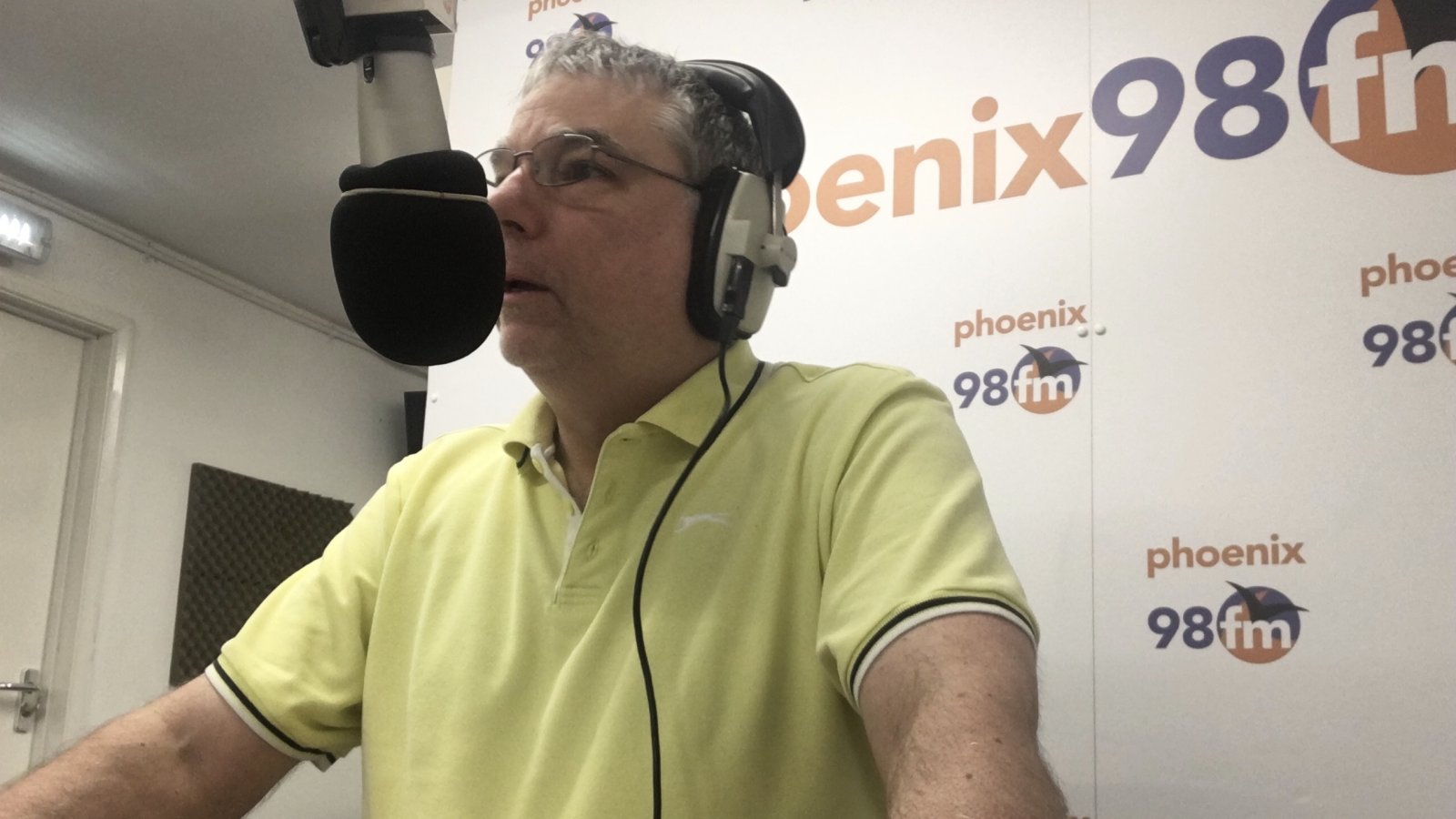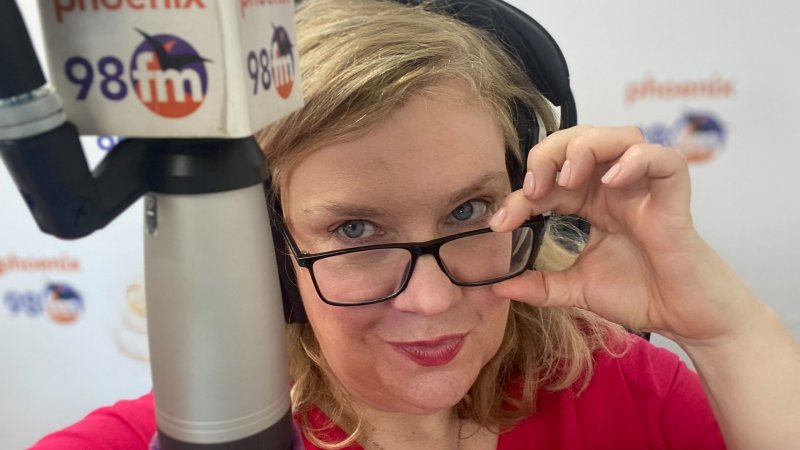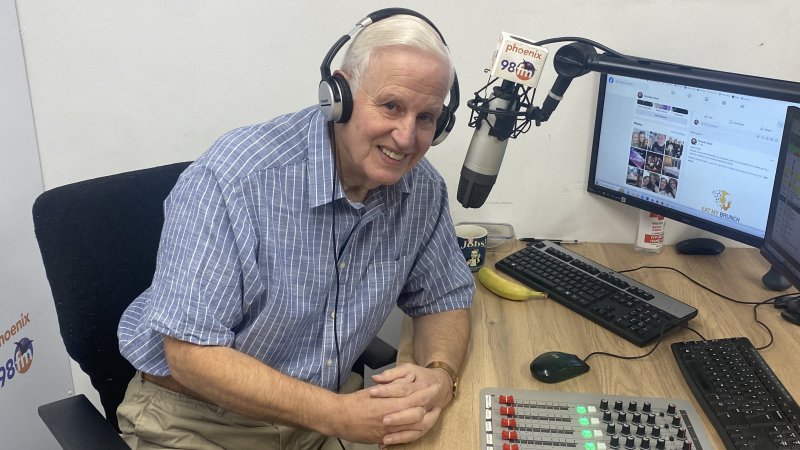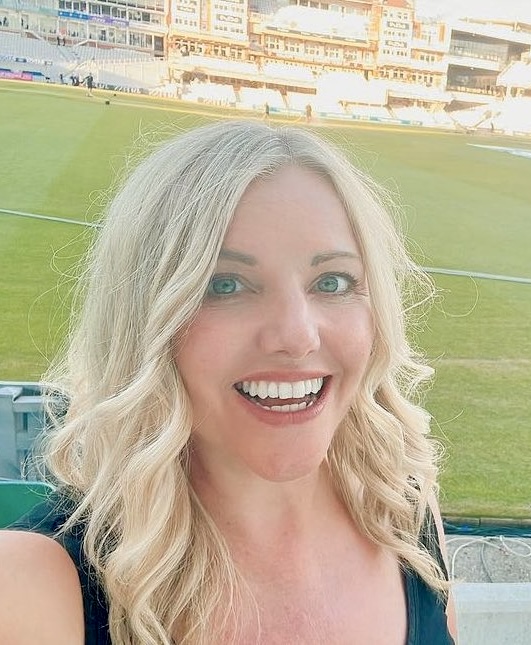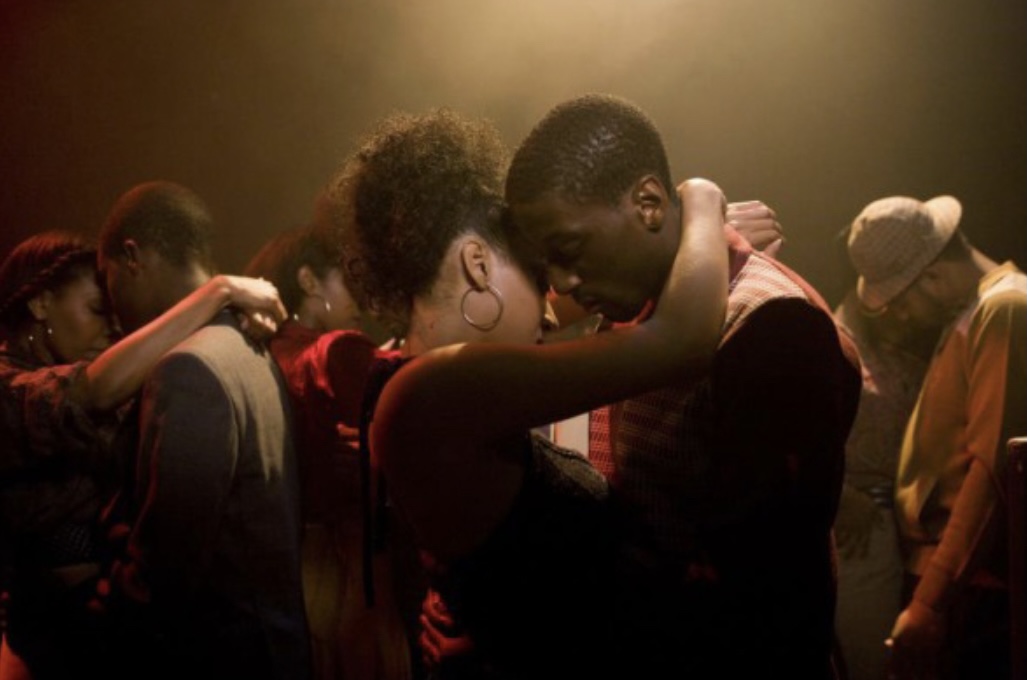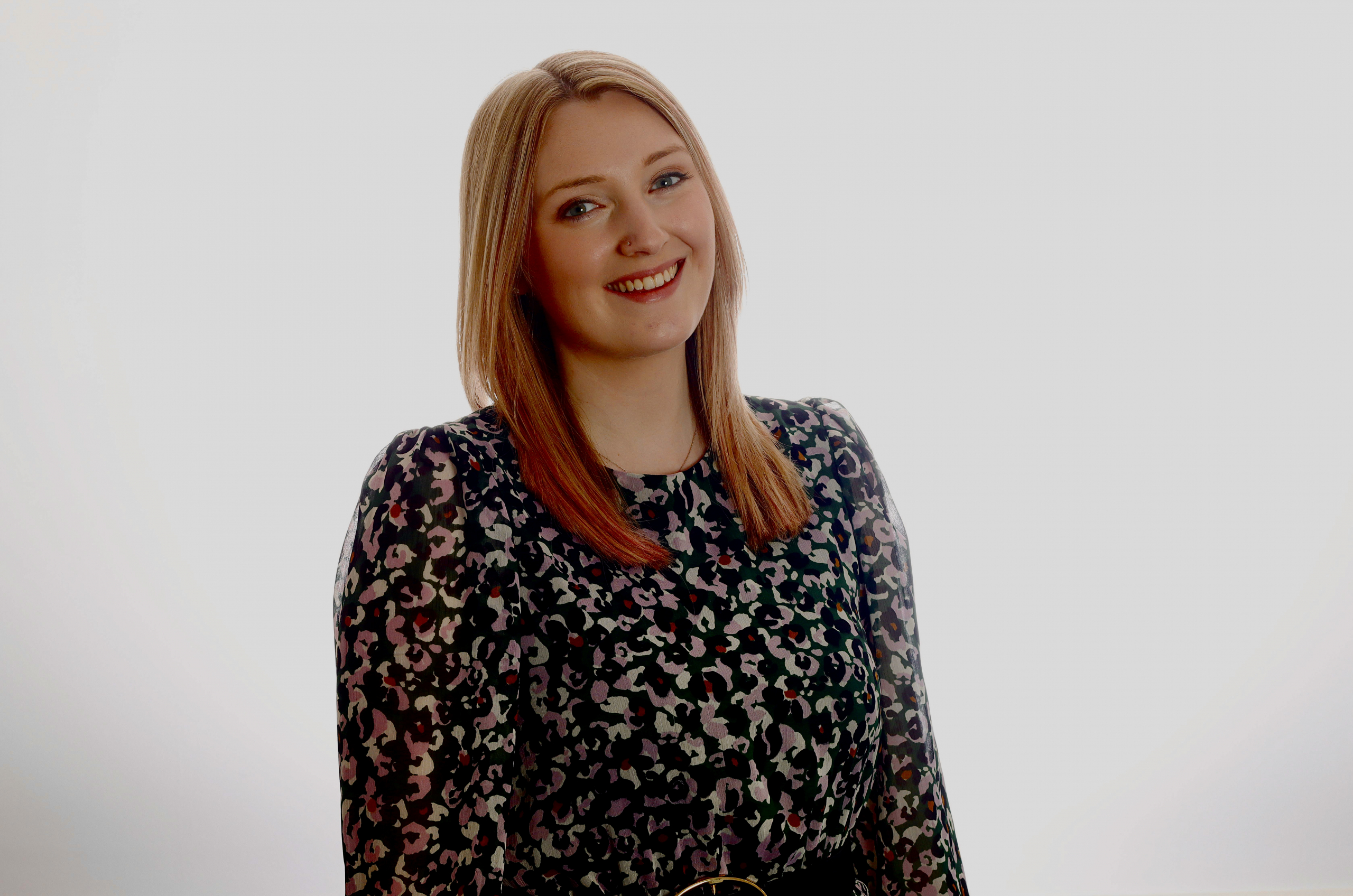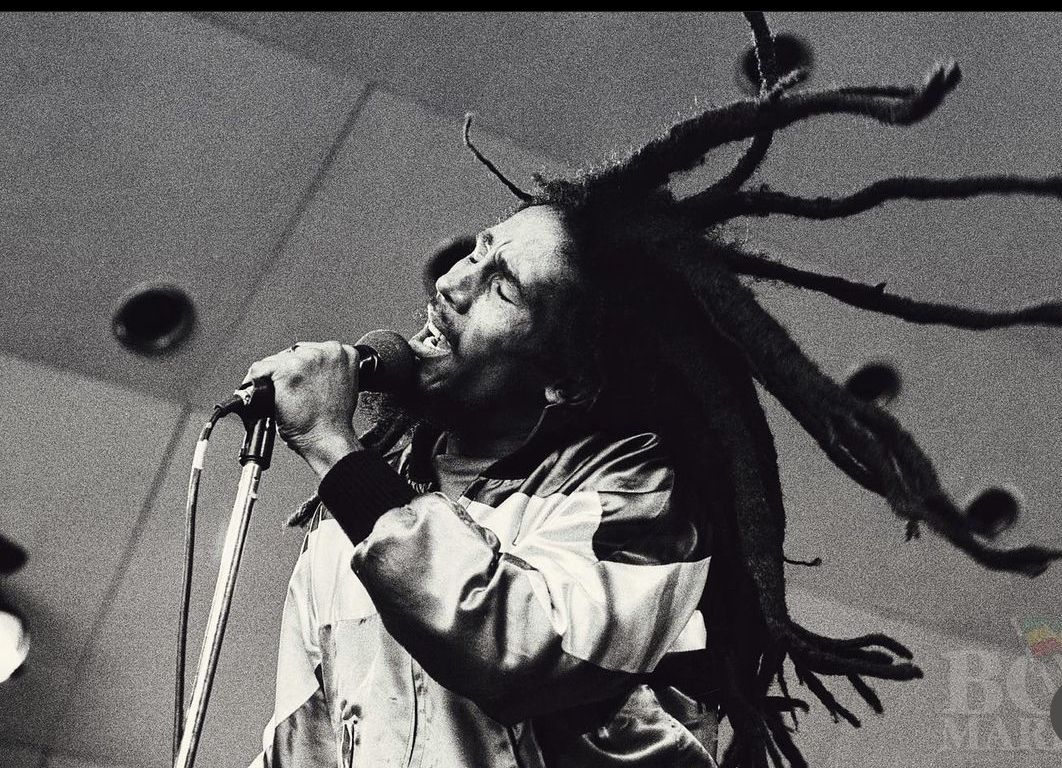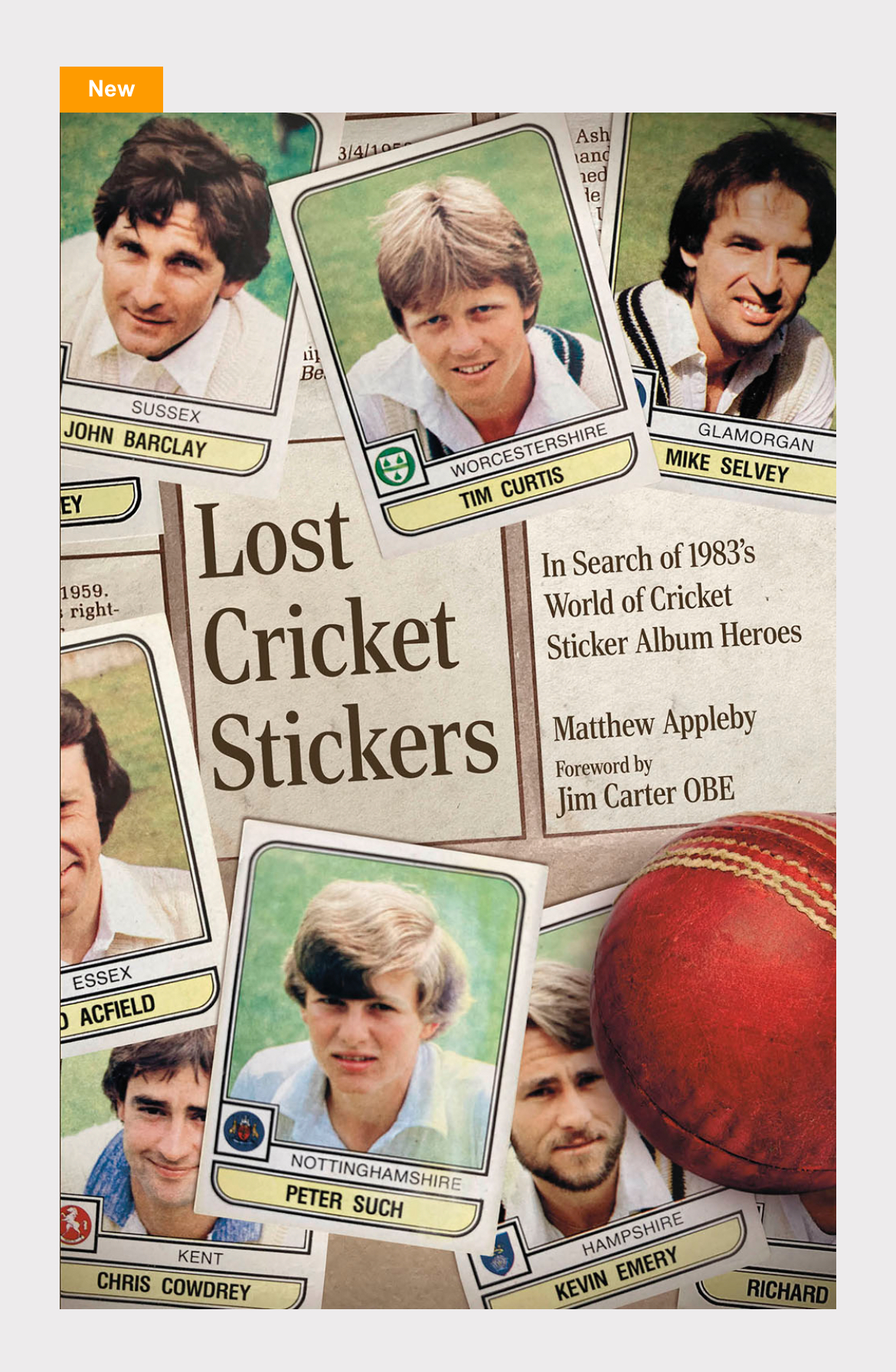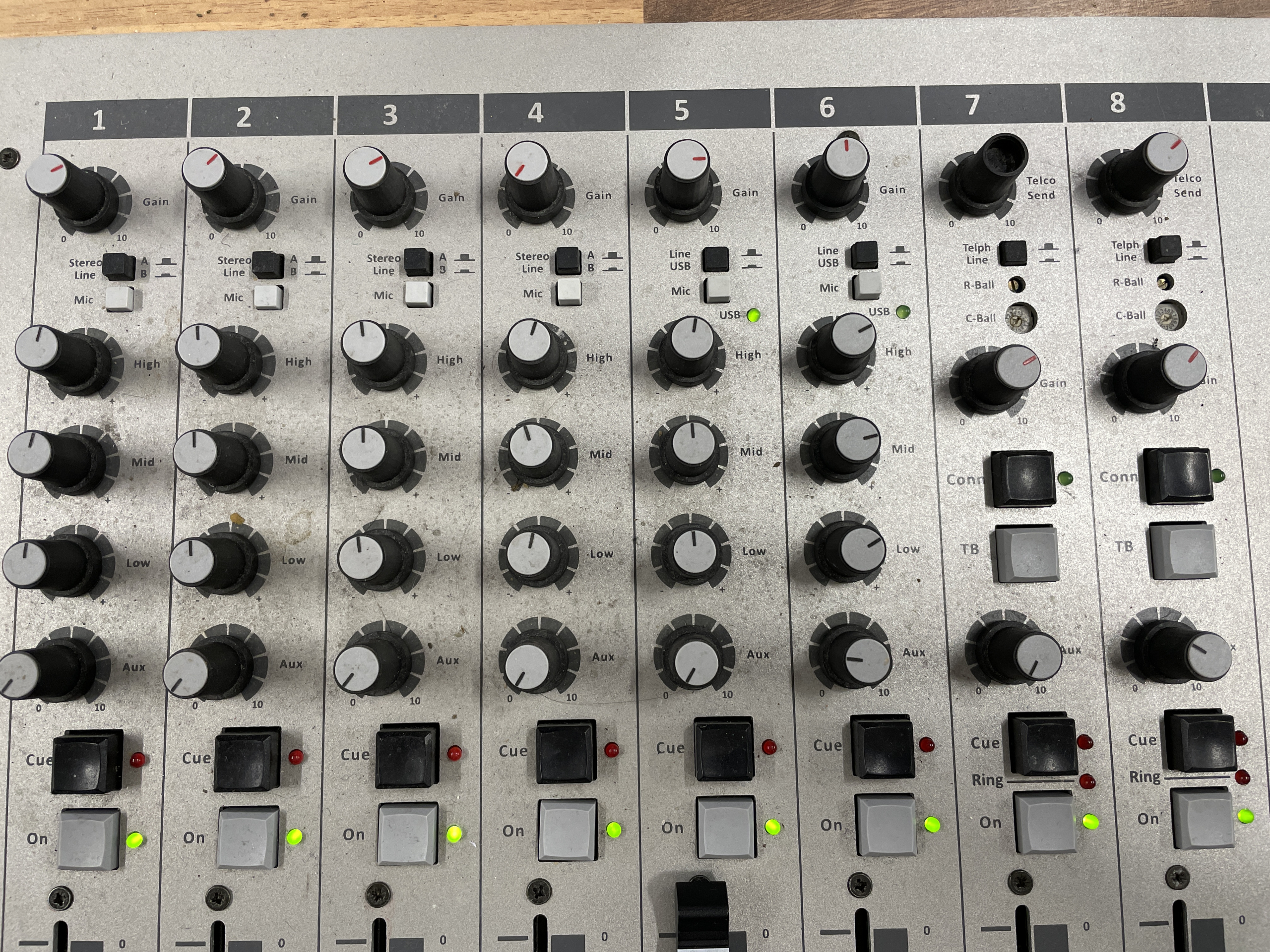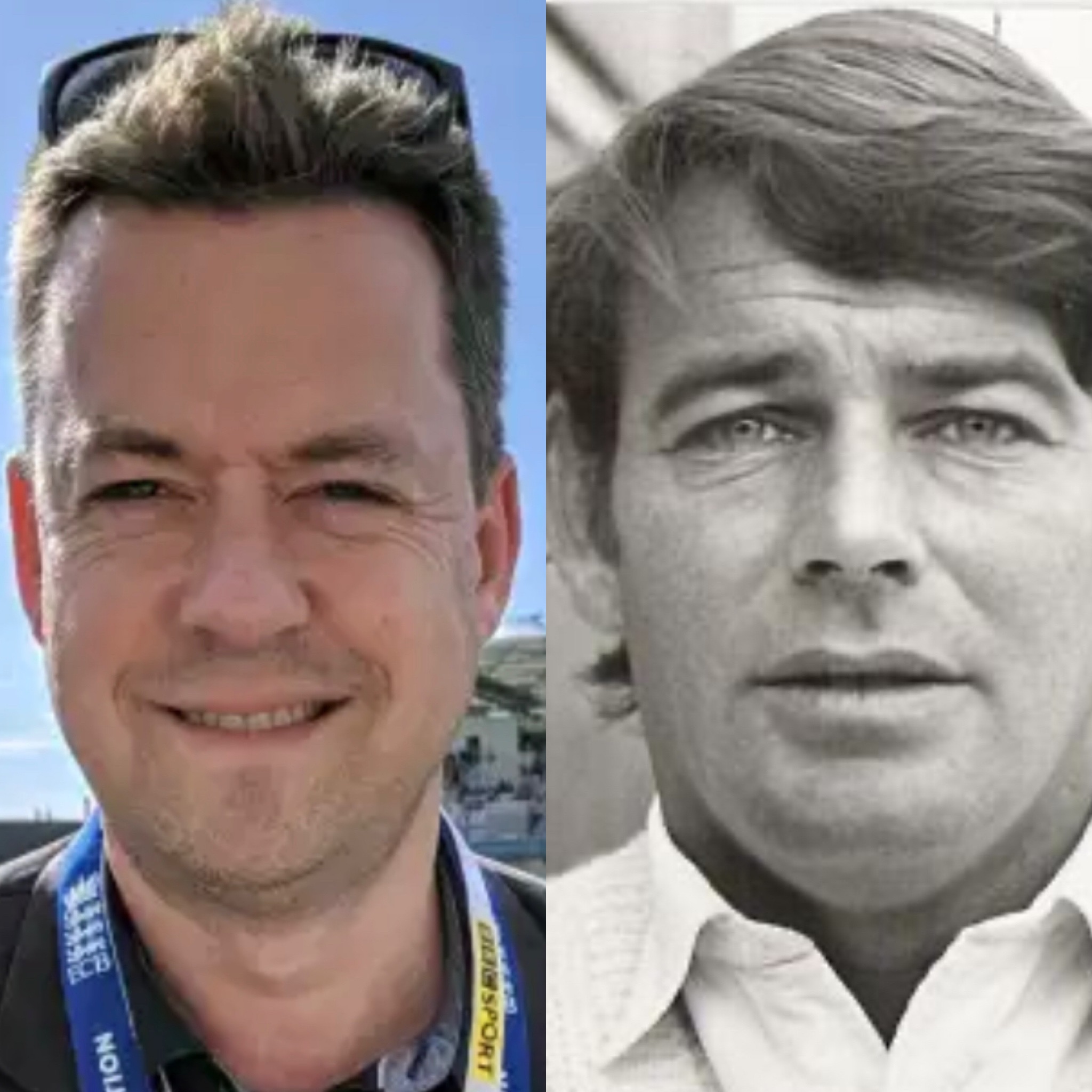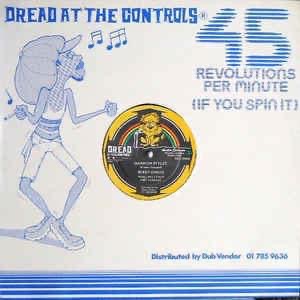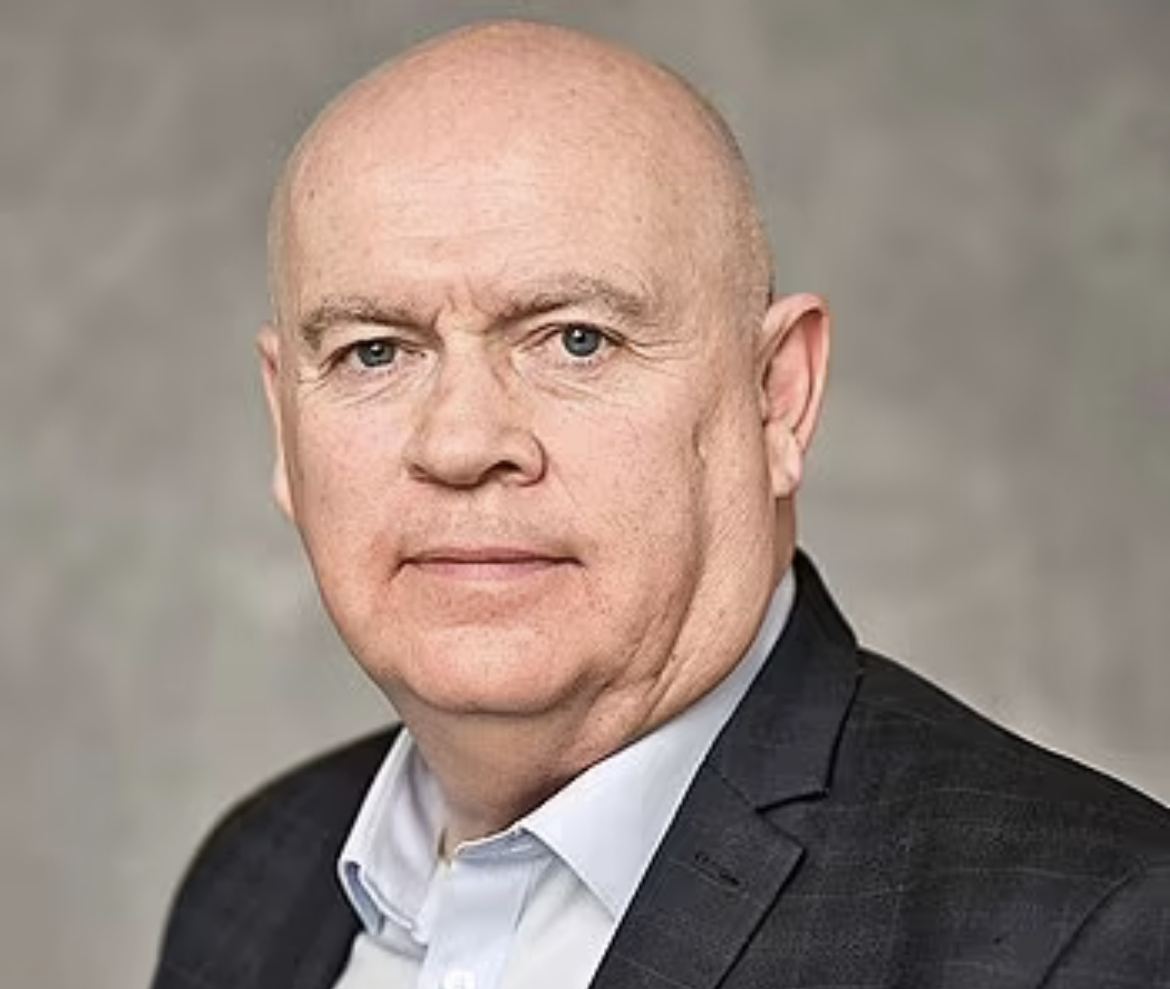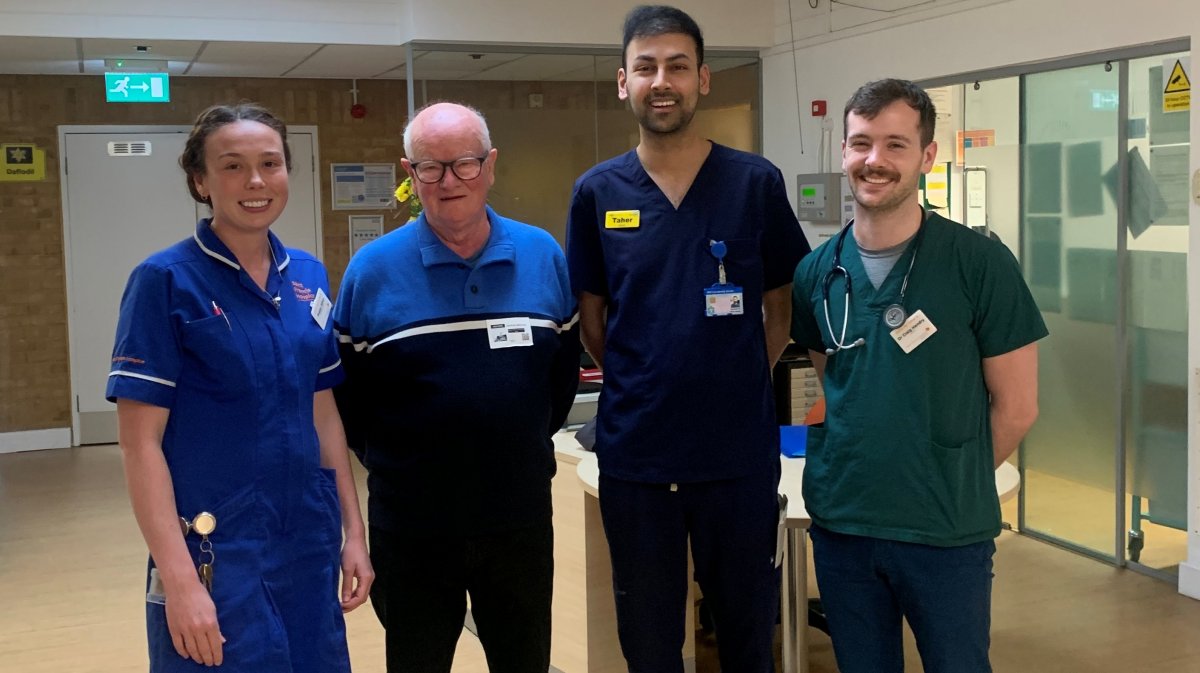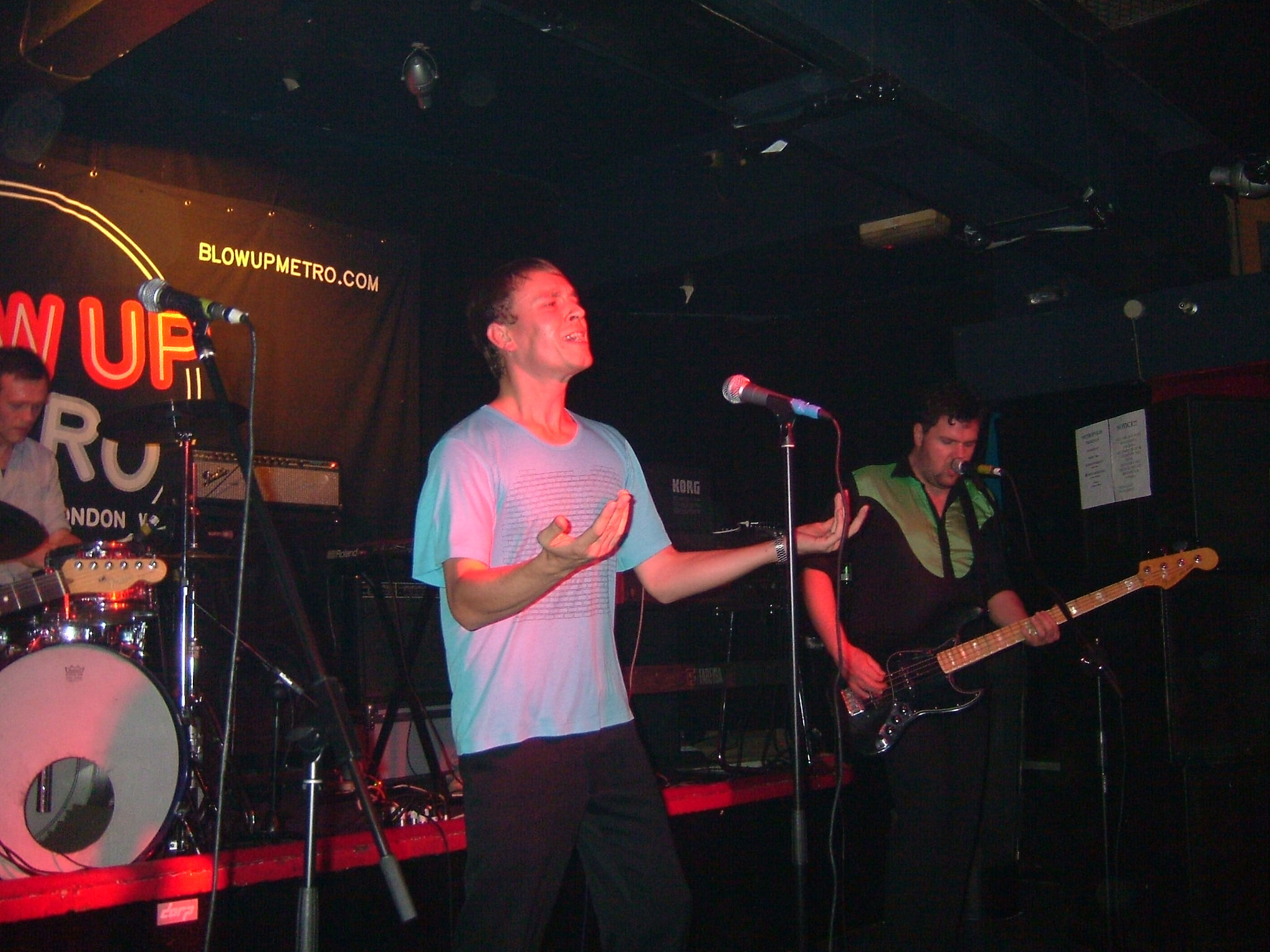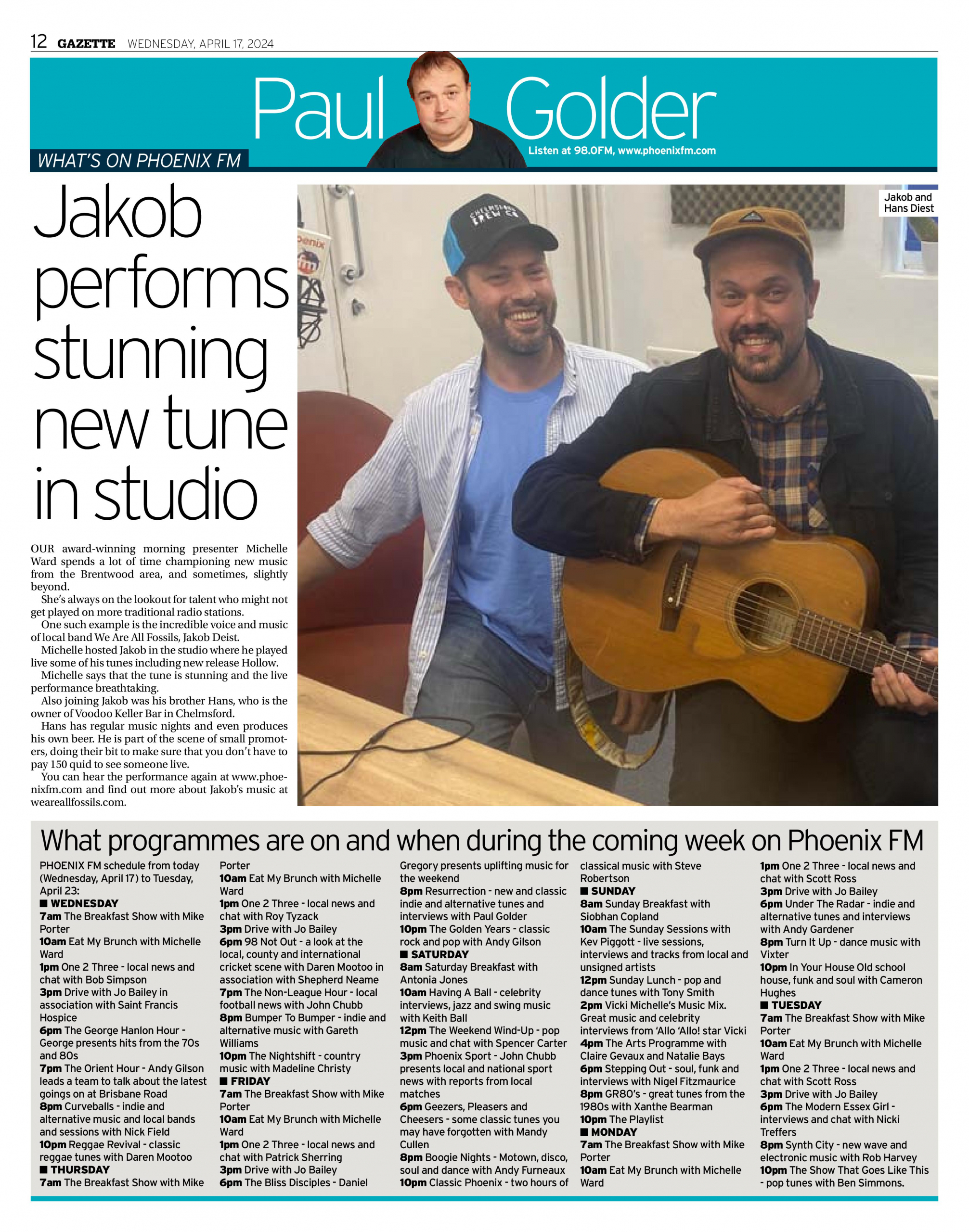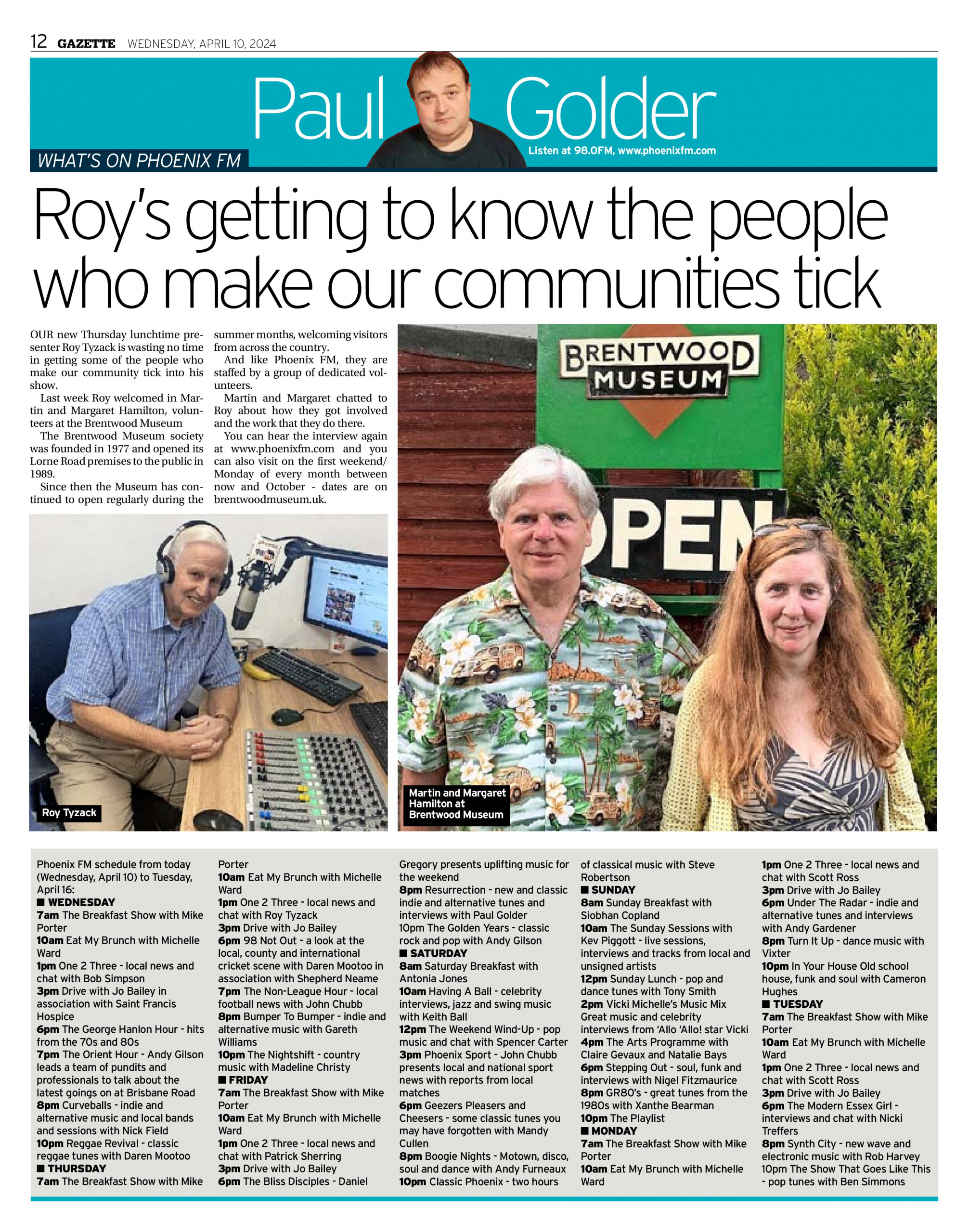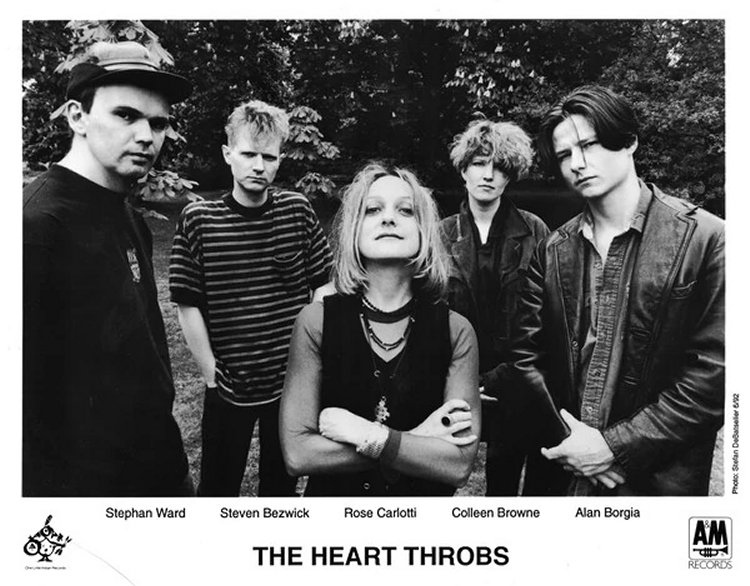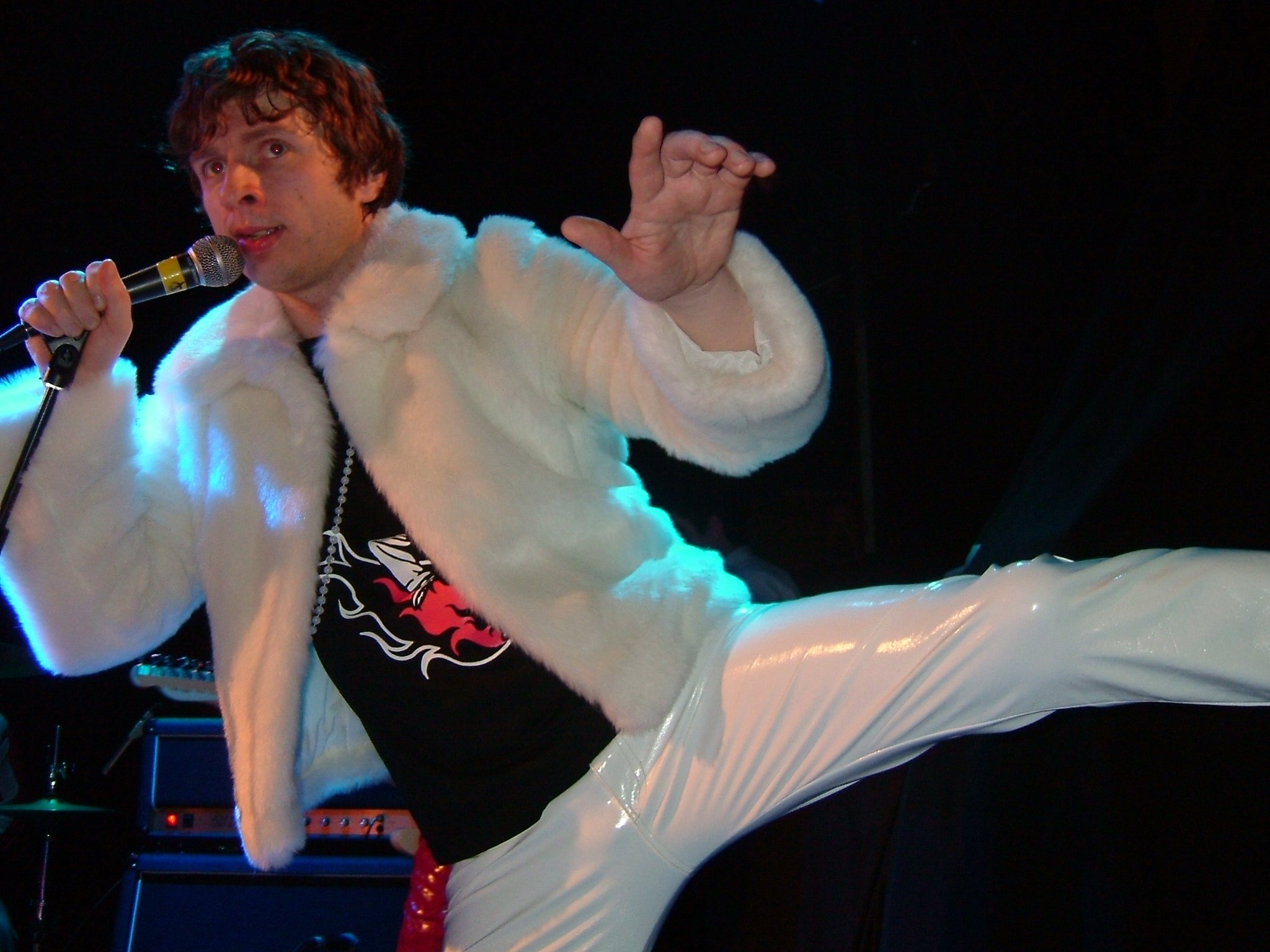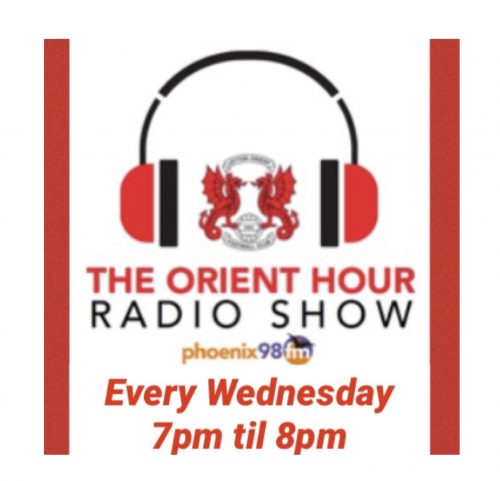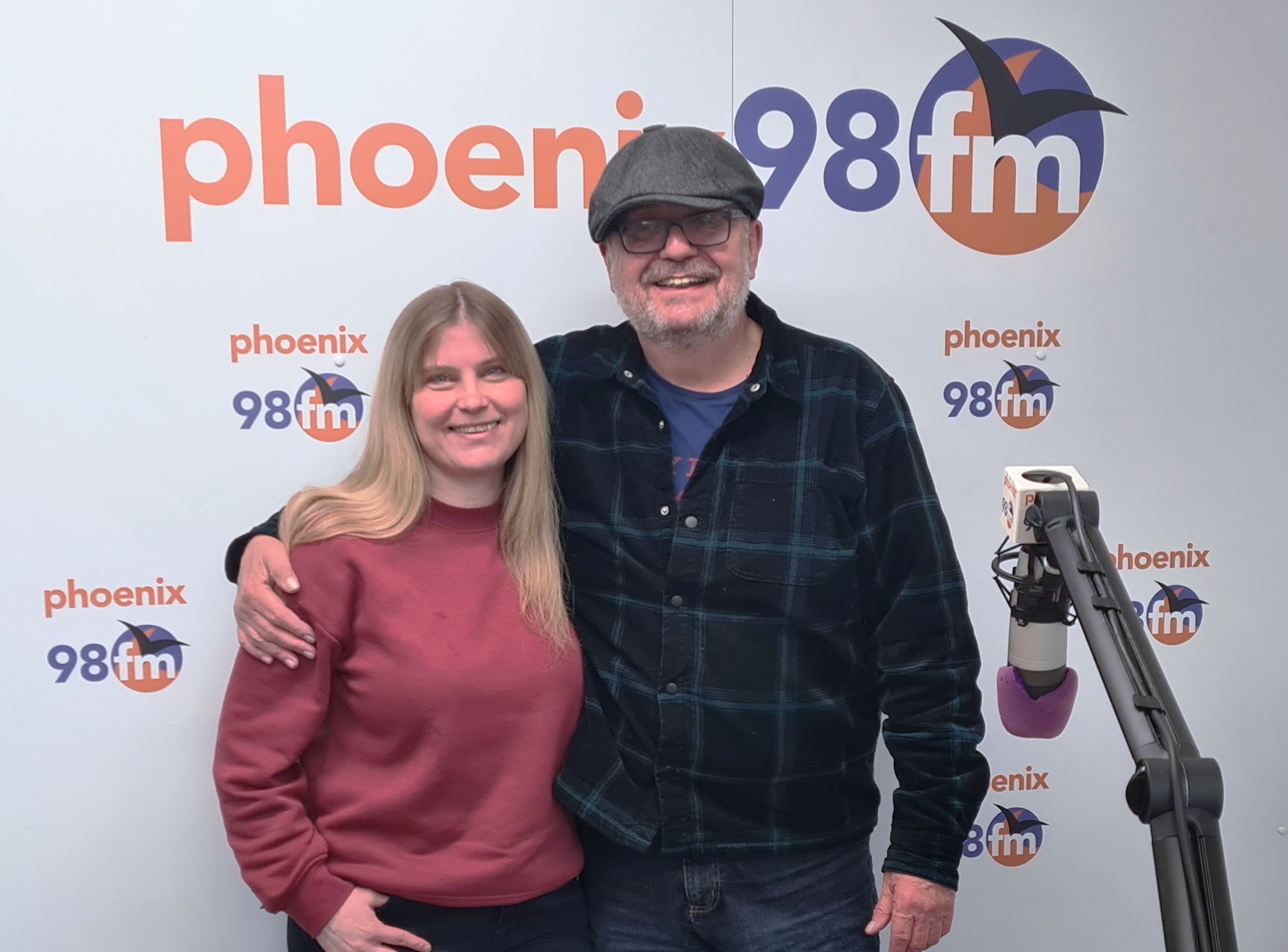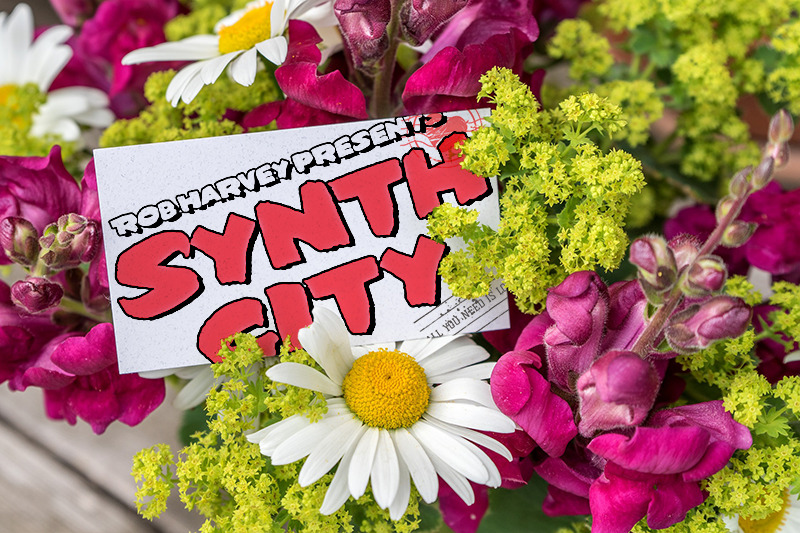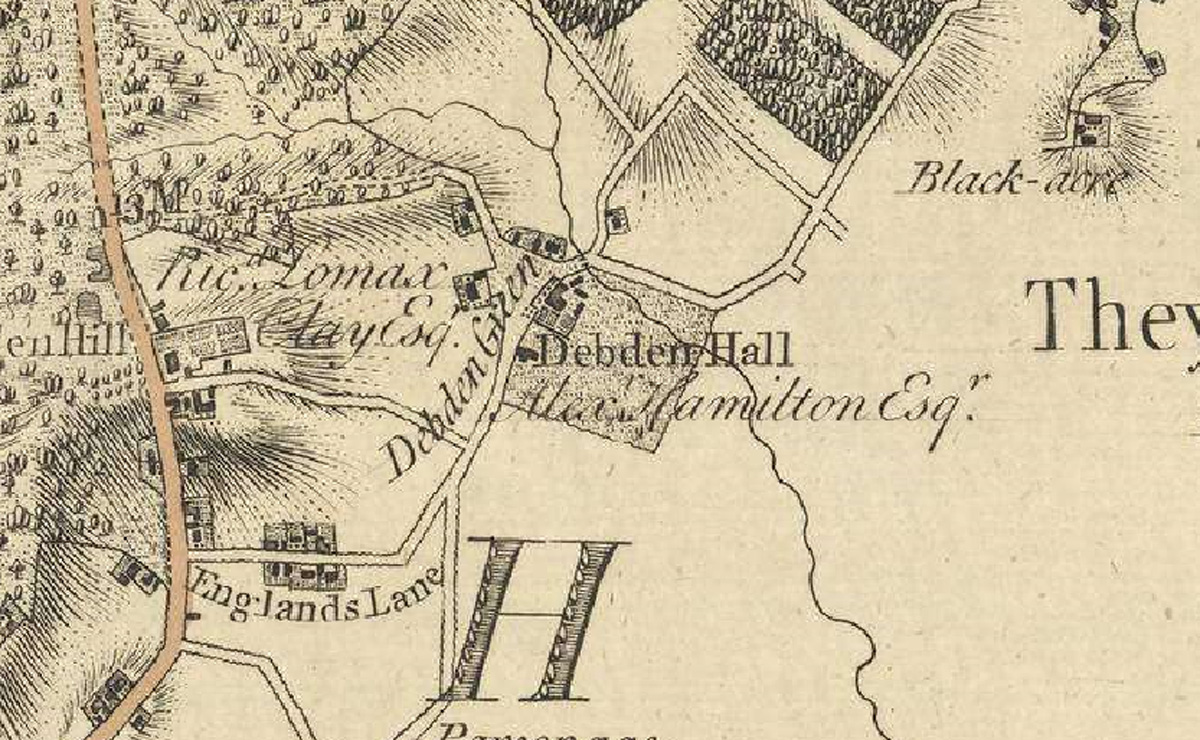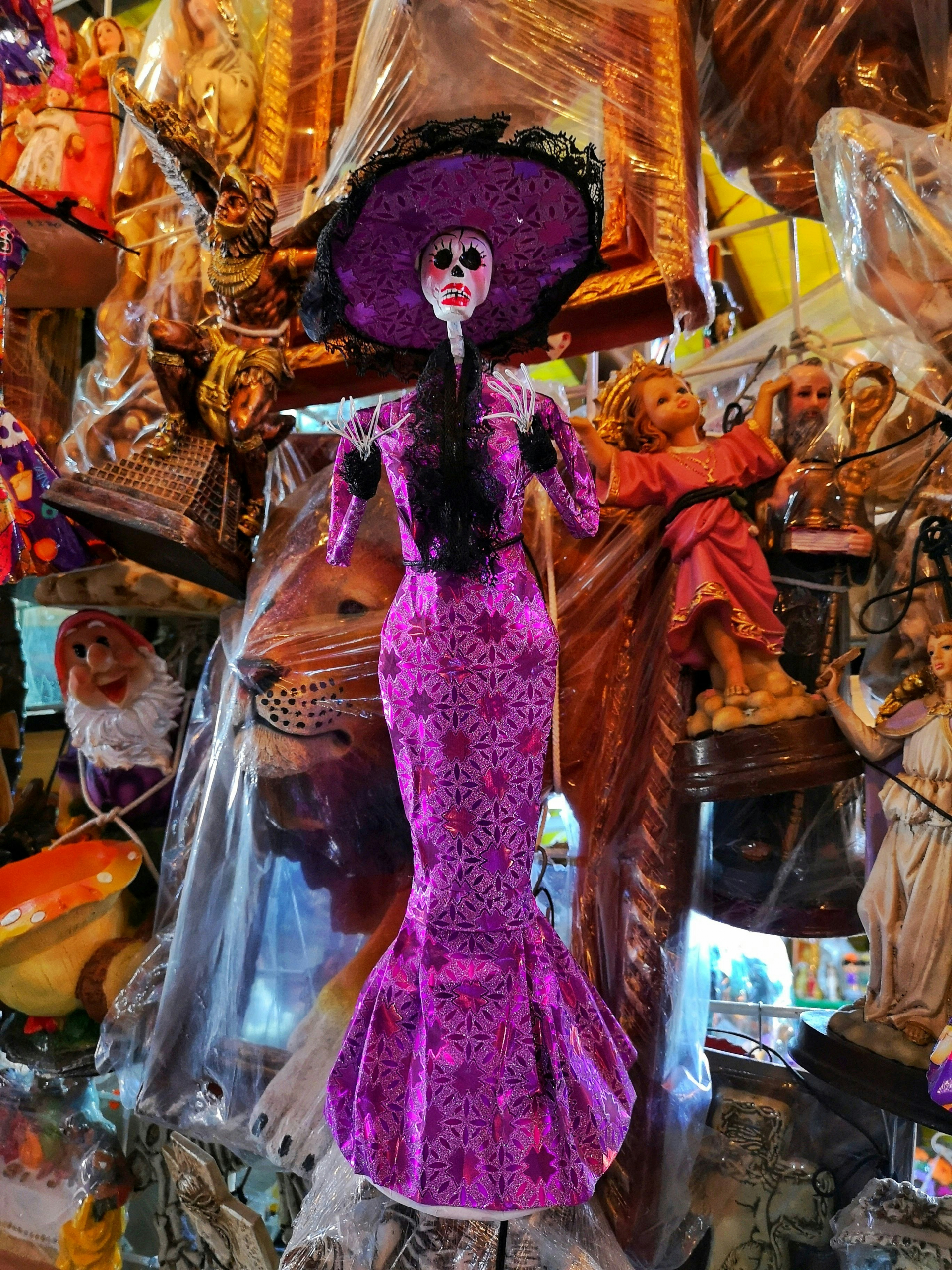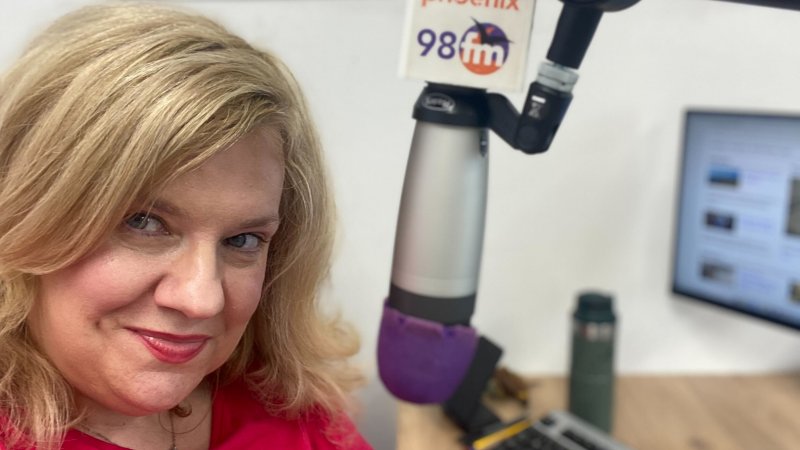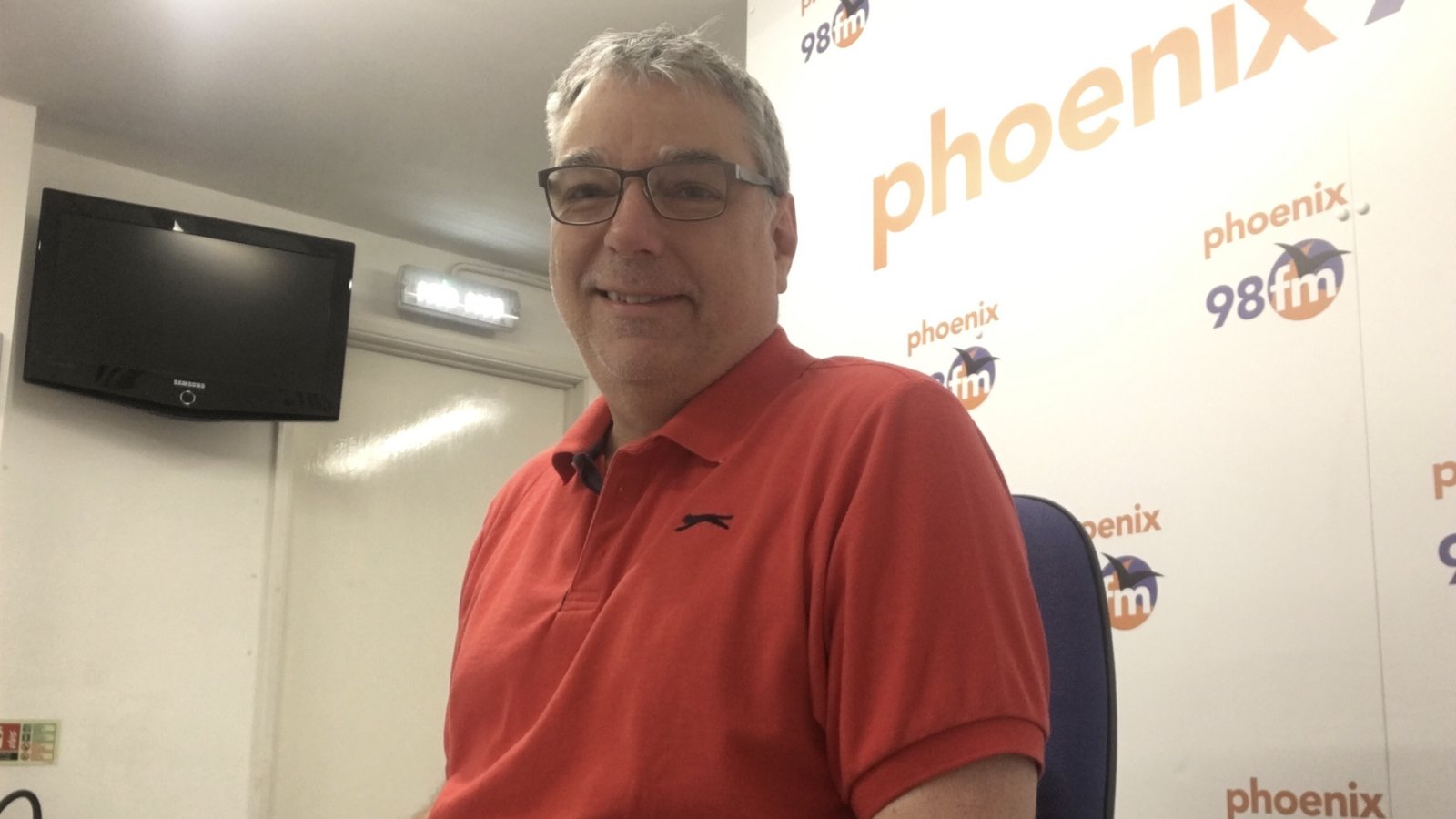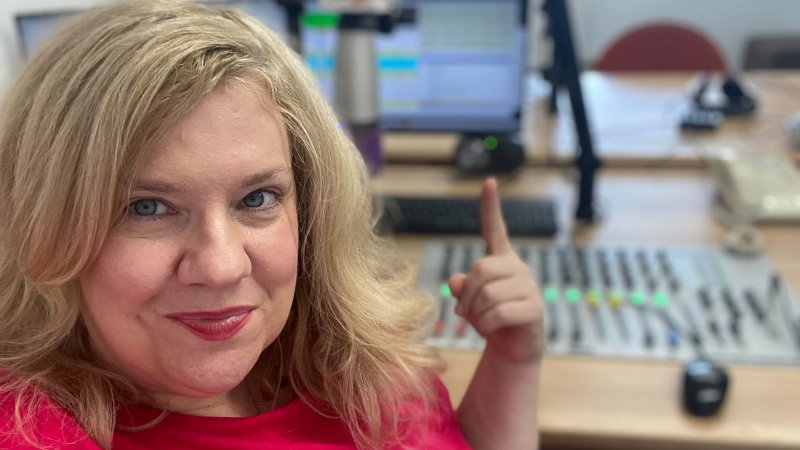Twenty years ago today – 31 August 1996 – I started Phoenix FM.
Why I ended up in community radio is still a bit of a mystery to me. I had never harboured any dreams of being a DJ although I always loved music and in the 1990s I was spending an obscene amount of my salary on CDs and gig-going. I also had no kids and tons of free time.
In the summer of 1995 I enrolled in a one year Greek course at Bishop’s Hill Adult Education Centre in Shenfield. That turned out to be a bit of a disaster, as after 60 hours of lessons I only knew enough of the language to order food and beer. (Actually that’s not a disaster at all). However I did see a poster there that caught my eye …
We are setting up a new radio station for Brentwood
For more information call …..
So I did, and ended up at the group leader’s house in Romford. I found out that he was applying for a 28 day licence to broadcast on FM which, in the days before internet radio, was extremely exciting. He also said he was going to apply for a full time licence too. I told him I wanted to play 2 hours of indie music – and then had to explain to him what indie music was. He didn’t seem too offended, and said that I could have a two hour radio show for four weeks when the station came on air that August and September.
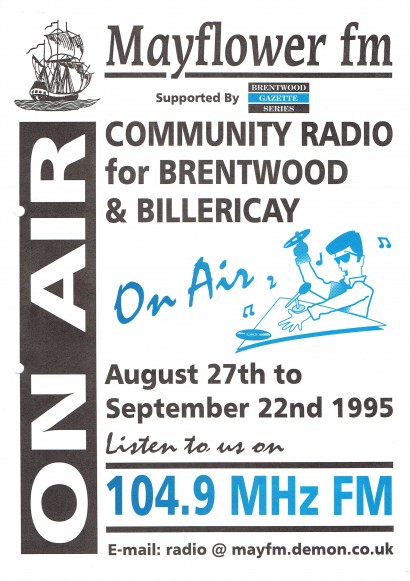
Notice the poster has an email address but no website. That was the internet in 1995 …
I went to the first group meeting the following week, saw about 75 people crammed into his living room, and thought “I’m not going to get my radio show if I don’t give them something in return”, so when he asked for help raising funds to help pay for the cost of the broadcast, I was one of about 2 or 3 people who offered.
My stock rose a bit higher when it turned out I was the only person there who owned a PC and a printer. It rose again when I told them I had access to a photocopier at work! The group formed a new company, the group leader became the Managing Director and I was one of other two directors on the board. In the meantime, the MD decided to name the station Mayflower FM and move it to Billericay. This puzzled me a bit, because our studio site was to be the car park of the Hermitage in the centre of Brentwood. But we stuck with it, and I managed to raise about two-thirds of the £5,000 needed to put the station on air by walking up and down Brentwood, Shenfield and Billericay and persuading companies to advertise on a station that didn’t exist.
September came and the broadcast was a real eye opener. The group had no equipment or transmitter, so we had to hire everything in. The transmitter, aerial, studio, even the music – everything!

Our broadcast home for the 28 days was an old BBC outside broadcast van. It was dirty, cramped and the 2 CD players seemed to break down every 45 minutes, leaving one of the presenters in tears on one particularly bad evening. None of us had any real radio experience before except for our marquee signing, Edward Cole, who had 30 years of radio experience including occasional stints on BBC Radio 4.
Edward wrote us a nice letter after the four weeks were up, saying that he enjoyed his time on air but didn’t want to do it again as he couldn’t stand going back to “that ghastly box”. And this was from someone who spent years on filthy trawlers in the North Sea as part of the Radio 370 team …
Me in that ghastly box
The broadcast for me was fun, and I enjoyed playing Blur, Pulp, Salad and Stereolab albums on air, and we decided to get together and do it again. The team regrouped and we planned a new broadcast for March 1996. We ended up going on air a month later, as the Managing Director forgot to post the application fees to the Radio Authority. A new group of presenters came in, all nearer my age, and I started spending a lot of time in the pub with them. We got through our second broadcast and started planning another one for later that year.
While planning the next broadcast, the MD started to bring a whole bunch of his friends in, and gave them prime shows. Although he didn’t say so specifically, he was effectively sacking my new friends, as there was no way everyone could be given a show when the station came back on air. And it was the people whose futures were uncertain who were raising the money and walking around town promoting the station, not the new guys.
He also had an aversion to playing Oasis and told the daytime DJs not to play them. I was no big fan myself (personally I was a Blur-ite) but Oasis had just announced their two big Knebworth gigs, and 2.5 million people applied for tickets – so they were the biggest thing in music by far at that time. And our Station Manager decided listeners couldn’t hear them because HE didn’t like them. I was starting to think Mayflower FM wasn’t so much a community station now, but just his own private little fantasy.
I tried to talk to him to explain my concerns, but he didn’t really want to discuss it, and the whole thing stopped being fun for me. In June 1996, I said my goodbyes and walked out. And that was almost that.
I was still in touch with the new presenters and we were meeting regularly and I was still keeping up with the gossip from the old group, who were now leaving Mayflower FM one by one. A third broadcast was planned to start on 1st September. The Brentwood Gazette had even printed a schedule, with a number of people listed who’d already left.
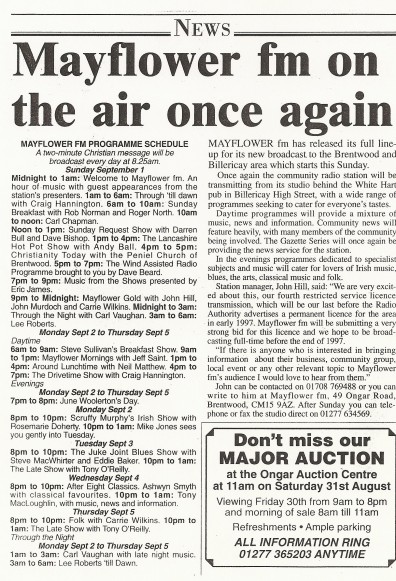
On 31st August I was in the Spread Eagle in Brentwood being plied with beer and cajoled by 4 or 5 of my former Mayflower friends to start a new station. I DID feel like it could be fun again and that we could do a much better job, so I relented, and The Phoenix was born.
We chose the name “The Phoenix” because there was a trend to not only drop the FM but to name stations after birds (“The Eagle”, “The Kestrel” etc) which I never really understood. I liked it because it was non-geographic, and I also mischievously thought the obvious “rising from the flames” connection might wind up my former colleagues a little and give them some healthy competition. I had also thought up a great back story – we were going to be based in Brentwood, a town whose name meant “burnt wood” and had risen itself, Phoenix-like, from the ashes of a forest fire.
At the time I was an accountant and left public practice to work as the deputy to the Bursar at Brentwood School, so setting up in the town was a no-brainer. As well as having lots of contacts and a 90 minute lunch hour, I was very popular with local businessmen, as Brentwood School was the only large local organisation who paid their suppliers on time!
I spent the next few weeks setting up a studio and office, getting advertisers on board and publicising our own 28 day broadcast, which was to start on 29 December that year. I’d learned a lot from my year at Mayflower FM and I didn’t copy any of the mistakes that they’d made.
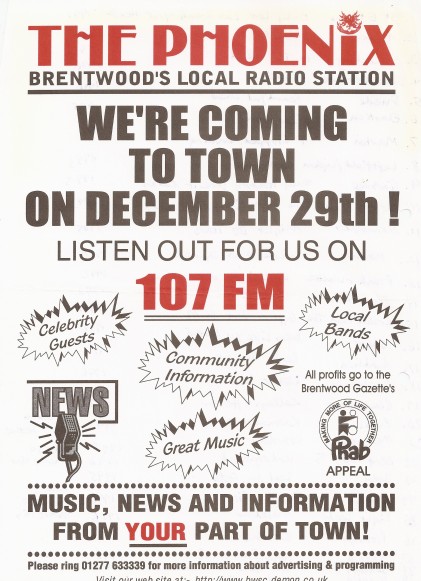
In the meantime – Mayflower did not go on air again. They had very few presenters and no one had actually bothered to raise any money after I’d left the group, so the studio man and licence fees couldn’t be paid, and no frequency was allocated. The new Mayflower team went to the Brentwood Yellow Advertiser to blame their silence on faulty equipment. Amazingly, the paper persuaded them all to sit in the car park, holding CDs and a cassette player and look as glum as they could be. One of the guys in the photo didn’t even want to touch a CD, and put it in his handkerchief for the photo.
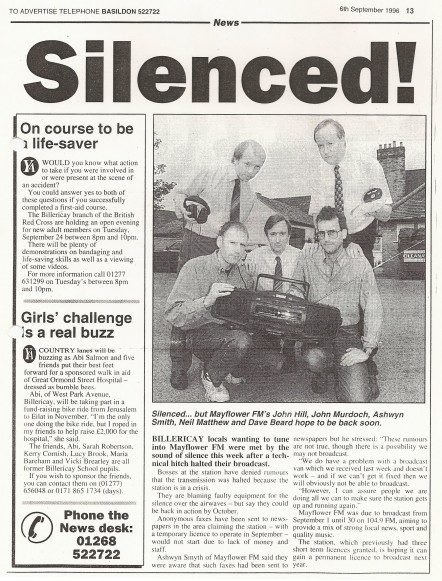
We formed a partnership with the Brentwood Gazette, and decided to put on just one broadcast only in aid of the Gazette’s PHAB minibus appeal. Mayflower FM got very upset when they heard our plans, and sent a number of press releases to the local papers, which got ignored. So the following week they sent them in again, saying we were “confusing” listeners and “poaching” businesses – the ones who we’d brought in in the first place.
The Gazette thought it was all hilarious and gave the “spat” a lot of coverage, which helped raise our profile.
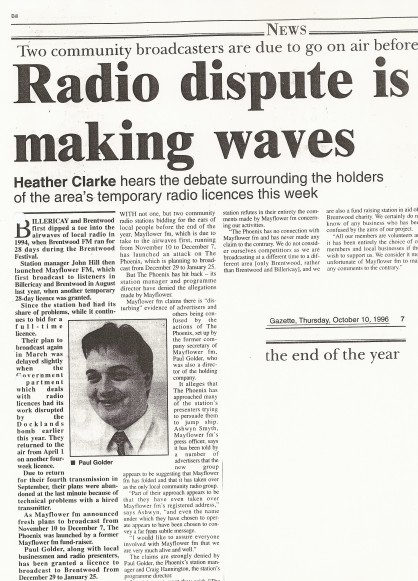
The Basildon Evening Echo – a daily paper which was bought in reasonable numbers in Billericay back then – was hostile to us because of our connections with the Brentwood Gazette, and went so far as to publish a story saying there was a “cash row” when there was no such thing (neither of us had any cash) and sarcastically described us as being “ironically named”!
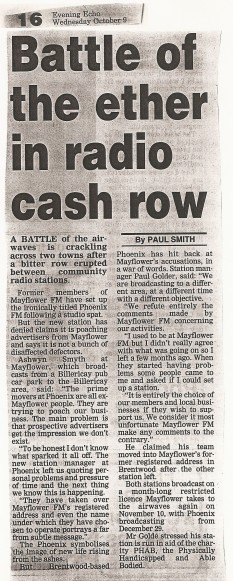
Local businessman Roy Dyer was instrumental in getting the station off the ground, arranging for our first broadcast to take place at the Information Centre – the town’s tourist information office which was then located at 14 Ongar Road, a building now occupied by Brentwood Mind. (2018 edit – now Landon’s Solicitors). Brentwood Borough Council’s officers were generally very supportive and gave us some rooms rent free, and allowed us to put our aerial on the roof.
The Mayor, Charles Myers, came down at midnight to launch the station. We then set the tone of it by playing six hours of loungecore music until 6am.
I lined up a few people to do shows and come in for interviews. None of us really had much radio experience, but I wasn’t too bothered about that. As well as us regular guys I approached as many local celebs as I could think of to get them involved. Steve Davis came in to do a soul show – I’d booked him for an interview on Mayflower by finding his details on the Brentwood School computer. Trevor Brooking, Fatima Whitbread, Helen Rollinson, Billy Murray (then appearing as Don Beech in The Bill on ITV) did likewise. International sprinter Jason Fergus came in for a chat about sports development, and liked it so much that he ended up presenting a dance show for the final three weeks. Essex cricketer Ian Pont presented our sports show, and Thin Lizzy’s Brian Robertson and Let Loose’s Rob Jeffrey were two of his guests.
Frank Bruno agreed to come in, forgot to turn up, and then denied he’d agreed to do at all. And Martine McCutcheon’s agent (or someone claiming to be) told me she wouldn’t get out of bed unless we paid her £5,000 for an interview. The agent literally used those words. But otherwise, all the local celebs were on board.
It wasn’t all plain sailing though. After the broadcast the council took me up on the roof of the Information Centre to show me where our station engineer had decided to put our aerial. It was attached to an aluminium scaffold pole, which was placed down a ventilation tube so the pole was sitting on top of a small plastic ventilator grille immediately above where you might sit if you were on the upstairs toilet. It was possible for the whole pole to come crashing down into the toilet bowl, whether someone was sitting there or not. If we hadn’t been leaving that day, we would have been served with a dangerous structure notice. You live and learn …
The broadcast ended and we managed to make a £500 surplus which we donated to PHAB. The Radio Authority then decided to open up some frequencies for new commercial radio licences. We spent the whole of 1997 putting together an application, backed with over 600 letters of support. The licence was awarded to Chelmer FM in March 1998 (they became Dream 107 and Chelmsford Radio and are now part of Radio Essex). Mayflower FM applied too – but after sacking all of their volunteers and directors during the application process, they also failed and disintegrated soon afterwards.
Our failure was a blessing in disguise – if we’d won, we would have no longer been a non-profit. I’d given 60% of the station to radio group UKRD who wrote our application – and they probably would have sacked all our volunteers too if we’d been successful. And then maybe me too, six months later. The station would have been rebranded and moved and Brentwood would have had no radio station at all.
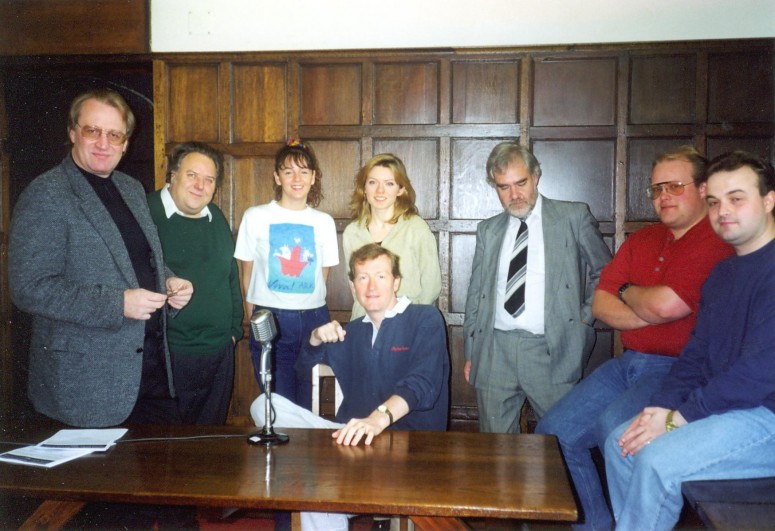
The team back in 1996. The photo was taken at Old Big School in Brentwood School. L-R back: Phil Smith, Dennis Rookard, Karin Ridgers, June Woolerton, Mike Miners, Brian Eringa and myself, with Steve Davis at the front.
We regrouped ourselves, decided to do more 28 day broadcasts – one more as “The Phoenix” in March 1999 and then ten more between 1999 and 2006, eight of them under our new name of “Phoenix FM” and two under the name of Eastgate FM in Basildon. In June 2001, thanks to a hookup with IT firm Enformatica, we became the first community radio station in the UK to broadcast a 24 hour schedule of internet radio programmes. The new online service was launched at the Hermitage by David Soul and Steve Davis’s Spitting Image puppet.
In February 2006 Ofcom called me to say we’d been successful in a second application for a full time radio licence, and we launched on FM permanently on 23 March 2007.
So the 20 year story of Phoenix has been two different ones … 10 years of trying to persuade the authorities to put us on air full-time, and then nearly 10 more wondering what on earth we’d asked for. We’re all proud of what we’ve achieved although we don’t usually celebrate 31st August as our birthday – the day we went full time was much more important. So the last thing I need to say on our 20th birthday is that I’m really looking forward to our 10th birthday next year!
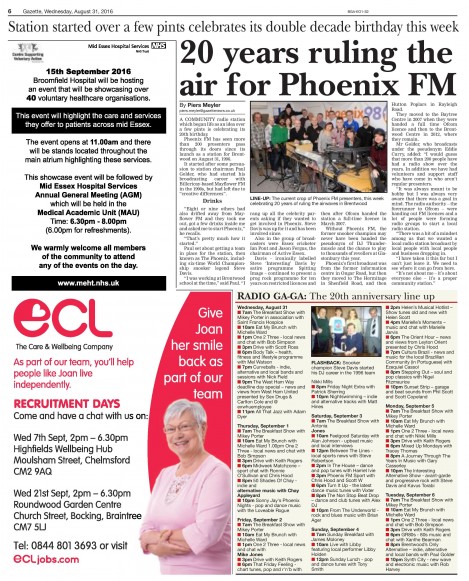
Our 20th anniversary as reported in the Brentwood Gazette

